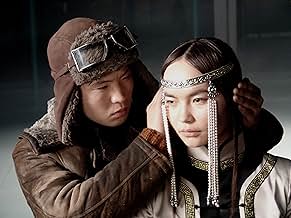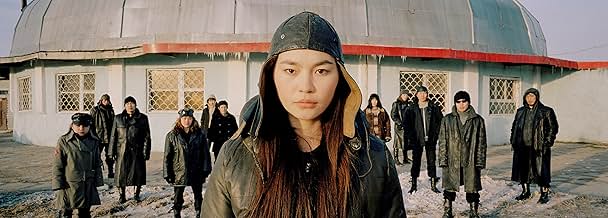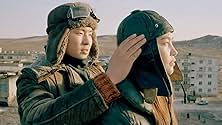Set in the frozen steppes of Mongolia, a young nomad confronted with his destiny after animals fall victim to a plague which threatens to eradicate nomadism.Set in the frozen steppes of Mongolia, a young nomad confronted with his destiny after animals fall victim to a plague which threatens to eradicate nomadism.Set in the frozen steppes of Mongolia, a young nomad confronted with his destiny after animals fall victim to a plague which threatens to eradicate nomadism.
- Directors
- Writers
- Stars
- Awards
- 16 wins & 5 nominations total
- Directors
- Writers
- All cast & crew
- Production, box office & more at IMDbPro
Featured reviews
I have just seen this film, and my opinion of it is mixed.
On the one hand, the film gives a detailed and intimate view of Mongolian life, especially in the first part; moreover, there is a strong political message behind it, which leads to some disturbing and powerful images (nothing too shocking).
On the other hand, everything is filmed in such a tediously slow manner that it becomes either mesmerizing or simply boring. Unfortunately, in my case, the whole audience including myself were not mesmerized. Moreover, toward the ending, the film becomes more and more surreal, which for me personally did not lead to a satisfied feeling at the actual end.
All in all, if you enjoy watching empty lands and silent people for a long time, you may be able to enjoy the positive aspects of this film. If, like me, you like films with at least the outline of a well-defined story and the feeling that you somehow understood what you just saw, this might not be the film for you.
On the one hand, the film gives a detailed and intimate view of Mongolian life, especially in the first part; moreover, there is a strong political message behind it, which leads to some disturbing and powerful images (nothing too shocking).
On the other hand, everything is filmed in such a tediously slow manner that it becomes either mesmerizing or simply boring. Unfortunately, in my case, the whole audience including myself were not mesmerized. Moreover, toward the ending, the film becomes more and more surreal, which for me personally did not lead to a satisfied feeling at the actual end.
All in all, if you enjoy watching empty lands and silent people for a long time, you may be able to enjoy the positive aspects of this film. If, like me, you like films with at least the outline of a well-defined story and the feeling that you somehow understood what you just saw, this might not be the film for you.
One of world cinema's biggest virtues is that it allows us to have a personal vision of distant places where it would be difficult for us to travel due to various reasons. Mongolia is one such remote area which has caught the attention of various film directors as many films have been set in this vast central Asian nation ever since it was popularized in 1989 by renowned German director Ms. Ulrike Ottinger through her film "Johanna D'Arc of Mongolia". Mongolia is honestly represented by ethnographic filmmakers Peter Brosens and Jessica Woodworth. Khadak is not a documentary film but it has made good use of a lot of documentary cinema's conventions to get closer to reality. Although the main story moves slowly, there are plenty of minor stories to keep in check the viewers' attention. These stories are an excellent initiation into the lives of people in Mongolia as each story represents an event related to the lives of the protagonists. One needs to watch this film if one's knowledge of ethnographic films is restricted uniquely to films made by Jean Rouch.
I saw a screener DVD of this, but would love to see it on the big screen. A heartbreaking story of the nomadic peoples of Mongolia being forced to abandon their homes due to a "plague" outbreak among animals. Despite their own herds being healthy, the family who is the focus of the beginning of the film are forcibly moved to a mining town, where their son Bagi, who has visions of his ancestors is forced to work for a pittance. Other nomads have been detained for offenses like playing music publicly. The only food available seems to be potatoes, but there appears to be meat available on the black market, and this feeds speculation that the clearances were not motivated by animal sickness after all. Bagi is arrested and while in the detention center meets a group of young activists who want to rebel against their unlawful imprisonment, and to free the animals they know are still alive. The song they perform is a high point of the film, and adds to an already excellent score and soundtrack.
This story does not have an entirely happy ending, but there is some measure of hope and redemption here. The film's strength lies in its very simple visuals and minimal dialogue, which powerfully portray a way of life that is dying out due to government interference.
This story does not have an entirely happy ending, but there is some measure of hope and redemption here. The film's strength lies in its very simple visuals and minimal dialogue, which powerfully portray a way of life that is dying out due to government interference.
The reviewer of this film from Holland provides an excellent perspective of this film as an experiment in art. As an anthropologist familiar with Mongolian nomadic culture and the historical background of the horrible collectivizing results of the Maoist government of the PRC on the population of inner Mongolia where thousands died due to the heavy handed and incompetent Maoist policies, I can certainly relate to the subtext of the story of Khadak. As a film, the organization of the storyline leaves much to be desired and does have an amateurish feel to it. However, the portrait of the Mongol people in this film against the bleak background of the steppes where they've lived for centuries and the shoddy, bleak living complex and mining facility to where they've been relocated, is quite striking. The faces of the actors in long and short still shots adds to this effect. Personally, I find the Mongols to be a strikingly beautiful people with a unique history ranging from great conquest to severe abuse under both Chinese and Soviet hegemony. In this context, I find this little film to be quite good in spite of its shortcomings.
10mikellj
A true work of art. An emotional journey that captures the soul of Mongolian culture and tradition while posing important questions on the dilemma facing traditional Mongolian values by the destruction of Mongolians most precious treasure, their land, by international mining operations.
Beautifully crafted scene's and soul shaking audio design tell much of the story that has been left unverbalized. The directors have done an amazing job of researching Mongolian culture, society, social changes, etc. and show a true appreciation for Mongolia's heritage.
The directors use of a generally unexperienced cast, with the exception of a few of Mongolia's best, had astounding results. The actors who played the main characters Bagi and Zolzaya were flawless, especially considering they have never acted before.
Reading the synopsis and interviews with the directors afterwards may help some not familiar with Mongolia to better understand some of the deeper meaning and symbolism embedded in this film.
10 out of 10!
Beautifully crafted scene's and soul shaking audio design tell much of the story that has been left unverbalized. The directors have done an amazing job of researching Mongolian culture, society, social changes, etc. and show a true appreciation for Mongolia's heritage.
The directors use of a generally unexperienced cast, with the exception of a few of Mongolia's best, had astounding results. The actors who played the main characters Bagi and Zolzaya were flawless, especially considering they have never acted before.
Reading the synopsis and interviews with the directors afterwards may help some not familiar with Mongolia to better understand some of the deeper meaning and symbolism embedded in this film.
10 out of 10!
Did you know
- GoofsIn the shots where the Shamaness is smashing the liquor bottles on the ground, several of them bounce, or just break into a few pieces, but the sound effect is still that of a bottle shattering to bits.
- SoundtracksMother Mongolia
Written by Altan Urag
Performed by Altan Urag
Details
Box office
- Budget
- €3,000,000 (estimated)
- Gross US & Canada
- $3,139
- Opening weekend US & Canada
- $1,983
- Oct 14, 2007
- Gross worldwide
- $37,781
- Runtime
- 1h 44m(104 min)
- Color
- Sound mix
Contribute to this page
Suggest an edit or add missing content







